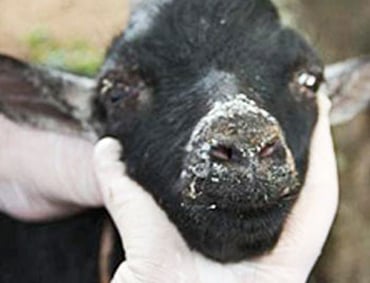“[Livestock] farmers have become miserable with many unable to sustain their livelihoods after the death of their goats and sheep,” Romain Badalalabuna, chairman of the livestock farmers’ association in the worst-hit area, Masimanimba Territory, told IRIN.
Badalalabuna, who is also the chief veterinarian there, had a flock of 38 goats, but 30 have died.
PPR symptoms include lassitude, fever, discharges from the eyes and nose, sores in the mouth, laboured breathing and diarrhoea.
The disease was first reported in 2012 in the Bandundu district of Kwango before spreading to Masimanimba where it has killed an estimated 24,000 sheep and goats, according to Anne Mbusu, Masimanimba Territory's administrator. It has also spread to neighbouring Bas-Congo, Equateur and Kasai provinces.
The current outbreak is particularly lethal, with an 86 percent mortality rate in goats, according to a statement by the UN Food and Agriculture Organization (FAO), which said DRC is believed to have been infected since 2008 when the provinces of Bas-Congo and Kinshasa reported PPR outbreaks.
Masimanimba was home to 560,000 goats and sheep before the current outbreak.
The local authorities have been trying to raise awareness of the disease. “We went to radio stations to sensitize farmers that it was in their interest to slaughter animals that have caught the disease to protect those farmers that haven't been affected yet,” said Mbusu.
PPR is not spread from livestock to humans.
Just over 80,000 goats and 40 sheep have died in Bandundu, according to Roger Penekoko, a provincial official in charge of agriculture, livestock and fisheries.
The deaths have affected household incomes and could affect nutrition too.
“My goats were like a bank account for me. I could sell a goat to pay school fees, or hospital fees whenever a member of my family fell sick,” Dephin Mferre, a goat farmer, told IRIN.
Of Mferre’s initial flock of 21 goats, 20 have died since April, meaning that he is now unable to prepare his five children for the next school year.
Sheep and goats are generally kept by poor farmers - those least able to absorb the loss of one of their few assets, says FAO.
No compensation
Government compensation for affected farmers has been ruled out. “Bandundu Province has a small budget of US$250,000. We don't have a budget for emergencies like this disease,” said Penekoko, noting that the disease had stabilized in Masimanimba and other parts of Bandundu Province but that the vaccination of healthy animals was yet to start.
PPR, which is caused by a virus, is vaccine preventable.
FAO said the outbreak was a threat to DRC food security and could spread to southern African countries which have never had it. The government estimates that one million goats and 600,000 sheep are at risk of contracting PPR - a quarter of goats and two-thirds of sheep in the country.
In response to the current outbreak, farmers have been moving their animals away from infected villages to where, so far, there have been no outbreaks, said FAO representative in the DRC Ndiaga Gueye.
According to FAO, PPR, like rinderpest, can be eradicated “should there be the political will”.
“Excellent vaccines exist to protect small ruminants from PPR, and these can be a key weapon in combating it,” said Juan Lubroth, FAO's chief veterinary officer.
FAO will provide funds for vaccinating at least 500,000 sheep and goats in areas that are not yet affected as well as other control measures such as limiting animal movements, awareness-raising and increasing surveillance.
pc/aw/cb
This article was produced by IRIN News while it was part of the United Nations Office for the Coordination of Humanitarian Affairs. Please send queries on copyright or liability to the UN. For more information: https://shop.un.org/rights-permissions





